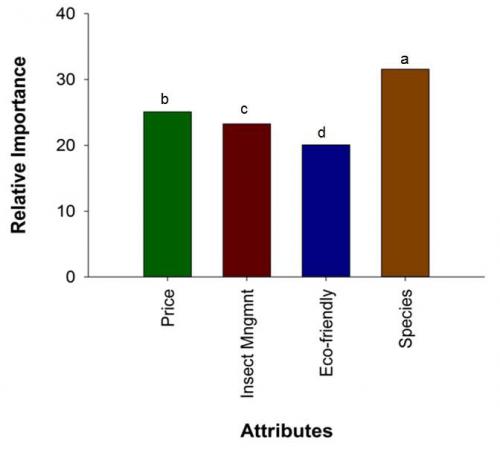What sustainable practices do ornamental plant consumers value?
Consumers value pollinator-friendly insect management practices over eco-practices.

There is mounting scientific evidence that populations of managed and native pollinators are declining from factors including habitat loss, dietary stresses, climate change, pesticide exposure and exposure to mites, parasites and pathogens. As a result of these reports and political and social pressures, numerous companies and organizations are creating pollinator initiatives to help address the challenges pollinators face. The Michigan Pollinator Initiative, Million Pollinator Garden Challenge, Bayer Bee Care Program and Bee City USA are just a few programs that are raising awareness about the importance of pollinators to agricultural yields and profitability as well as ecosystem biodiversity.
As these campaigns gain momentum and the media continues to publish stories about the pollinator decline, consumers are being increasingly exposed to information surrounding pollinator health. But how important are pollinator-friendly insect management practices compared to other factors when purchasing ornamental plants? How do they stack up with other high-profile challenges such as the droughts in California? Will consumers be willing to pay more for plants with eco-friendly practices?
In 2015, we reported the findings of the first year of a two-year study that showed that bee-friendly production practices were the best understood, while neonicotinoid-free production was the least understood alternative pest management practice. A new study published by researchers at MSU showed that ornamental plant consumers valued insect management practices that were labeled “grown using best insect management to protect pollinators” or “bee-friendly” compared with plants labeled with eco-practices such as “grown using recycled/recaptured water.”
In addition, plant species was overall the most important attribute to consumers when purchasing ornamental plants (31.6 percent) while eco-practices were relatively the least important (20.1 percent) (Figure 1). Surprisingly, the eco-practices were still considered the least important factor even in areas experiencing extreme droughts such as California.

Figure 1. Ornamental plant consumers valued the plant species the most and eco-friendly practices the least. Means with different letters are statistically different.
When consumers were directly asked about the connotation of the phrases, survey respondents said that “bee-friendly” and “safe for pollinators” were perceived most positively (Table 1). Survey participants were more neutral about any labeling containing the word “neonicotinoid” or if plants were labeled “grown with traditional insect management.” These findings are consistent with previous questions in the survey. Consumers were also willing to pay the most for plants labeled “grown using bee-friendly insect management practices.” Despite the fact that consumers were willing to pay more for “bee-friendly insect management,” more than 30 percent of respondents reported its definition generated confusion. These respondents reported the label referenced the plant’s food source quality and not the pest management practice (biopesticide, conventional, biocontrol).
|
Table 1. When consumers were asked which production practices had the most positive and negative connotations, plants “grown using bee-friendly insect management practices” and “insect management strategies that are safe for pollinators” were the most positively-viewed. | |
|---|---|
|
Plant production practice |
Mean |
|
Plants grown using bee-friendly insect management practices. |
4.18 a* |
|
Plants grown using insect management strategies that are safe for pollinators. |
4.14 ab |
|
Plants grown using best insect management practices to protect pollinators. |
4.06 b |
|
Plants grown using insect management practices that leaves no insecticide residue on the plant. |
3.95 c |
|
Plants grown using protective neonicotinoid insecticides. |
3.31 d |
|
Plants grown using neonicotinoid insecticides. |
3.18 e |
|
Plants grown using traditional insect management practices. |
3.13 e |
Garden center retailers and greenhouse growers interested in developing this product category should check out the new Michigan State University Extension “Smart Gardening for Pollinators” tip sheets:
- Gardening for pollinators: Smart plants to support pollinators
- Invite pollinators to your garden by creating a smart habitat
- Smart lawns for pollinators
These tip sheets, developed in 2016, are excellent to distribute to your customers and may help in marketing your “pollinator-friendly” plants. Greenhouse growers can also view webinars by MSU Extension on how to grow bee-friendly plants in the greenhouse and smart gardening for pollinators.
For more in-depth information, read our article in Green Profit Magazine, “The Impact of Eco-Friendly Messages.” You can also read “Comparative Consumer Perspectives on Eco-friendly and Insect Management Practices on Floriculture Crops,” a peer-reviewed study published in HortTechnology in February 2016 by Kristin Getter, MSU academic specialist, Bridget Behe, MSU professor of horticultural marketing, and me, greenhouse and nursery Extension educator.
Thank you to Bridget Behe and Kristin Getter for their co-authorship and implementation of this study.



 Print
Print Email
Email


